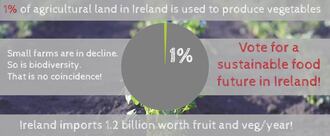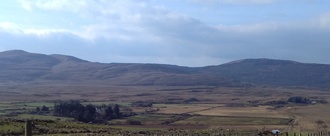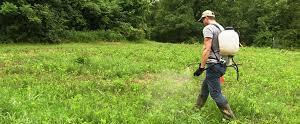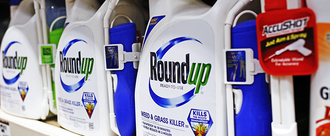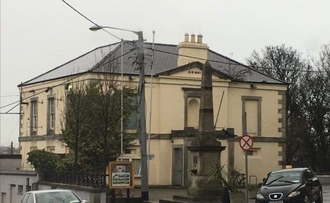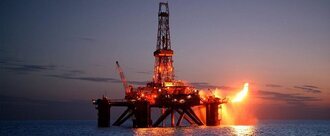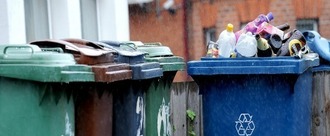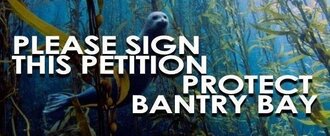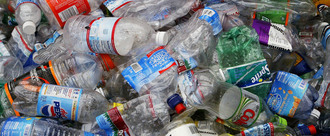- Featured
- Animal Rights
- Anti-racism
- Arts & Culture
- Children
- Climate
- Corporate accountability
- Crime
- Disability rights
- Economic
- Education
- Environment
- Food and Sustainable Production
- Gender Equality
- Governance and Transparency
- Health
- Housing
- LGBT Rights
- Mental health
- Northern Ireland
- Planning
- Privacy and Data Protection
- Rural Inequality
- Social Justice
- Trade
- Transport and Infrastructure
- Workers' Rights
- More
-
Vote for a sustainable food future in Ireland!Ireland finds itself under increasing pressure to reduce its agricultural GHG emissions. Climate change is upon us and is a serious threat to our environment, social and economic world, subsequently affecting our ability to continue a business-as-usual approach to food production. The state cannot continue to ignore the fact the expansionist agenda in agriculture is not working. It is not environmentally, economically or socially sustainable. Environmentally Unsustainable: Under Food Harvest 2020 and Food Wise 2025, our emissions under a best case scenario are set to rise by 6/7% to 2020 Over 53% of water pollution is directly related to agriculture, with one in three rivers and lakes now at risk of further pollution. What’s more, biodiversity continues to decline, with rare species on the verge of extinction Economically Unsustainable: Ireland’s agri-sector is dominated by small farmers, who are struggling to survive. Farmers find themselves caught between pressures in trying to get a fair price for produce and a CAP ( European Common Agricultural Policy) that rewards the bigger land-owner. Farm incomes continue to decline, a fact blamed on falling milk and grain prices, with the OECD-FAO outlook predicting that markets will continue to remain weak Socially Unsustainable: A shocking and unacceptable fact is that only 1% of Ireland’s agricultural land is used to grow vegetables. Ireland has to import vegetables worth 1.2 billion euro each year, making us vulnerable to fluctuations on the market. Earlier this year, a drought in Spain resulted in higher prices for vegetables. Food prices hikes impact everyone forcing many to substitute vegetables with cheaper, nutritionally poor, energy dense foods. Leading to various health problems. Climate change, political instabilities and other factors can affect imports, if imports stopped today we would have approximately 4 weeks of fresh produce left on our shelves. We are not food secure! We stand on the side of small farmers, who risk it all, day in day out, to produce healthy food, true custodians of the land, protecting the environment, preserving biodiversity, keeping skills alive and ensuring that future generations have the opportunity to produce nutritionally good food. These farmers continue to be pushed to the fringes, by the state and the EU. With this petition we want to show that we stand with these farmers. That we care and all want a sustainable food future. If you care about what’s on our plate, care about local economies and about a sustainable future. Make you voice heard by signing this petition. Let’s speak as one voice to the Irish government and tell them: - to support small farmers financially - to support farmers in diversifying their holdings - to offer supports to increase the amount of vegetables produced in Ireland for food security - to increase environmental standards in agriculture beyond carbon footprints and give incentives to those who meet and surpass those standards - to practice the polluter pays principle and heavily fine those who continue to pollute our land and waterways - to increase reforestation with native species in and around farms, to support farmers in transitions to agroforestry 1. http://www.epa.ie/pubs/reports/air/airemissions/2020_GHG_Projections_2016_Bulletin.pdf 2. http://www.independent.ie/irish-news/water-quality-in-one-in-three-irish-rivers-and-lakes-is-at-risk-of-deteriorating-35850649.html 3. http://www.thatsfarming.com/news/curlew-ireland 4. http://www.independent.ie/business/farming/beef/beef-farmers-will-again-struggle-to-cover-costs-in-2017-35290234.html 5. http://www.irishtimes.com/news/ireland/irish-news/ifa-president-says-farmers-again-struggling-to-make-a-living-1.2057112 6. http://www.independent.ie/business/farming/schemes/system-failure-massive-difference-in-cap-payment-rates-35118778.html 7. http://www.irishtimes.com/business/agribusiness-and-food/average-family-farm-income-down-9-to-24-060-1.3102770 8. http://www.agri-outlook.org/20 of 100 SignaturesCreated by Nathalie Markiefka

-
Ban now the use of Glyphosate based and other toxic Weedkillers used by Roscommon County CouncilThese chemical based weedkillers are highly carcinogenic and linked to a variety of potentially fatal diseases. Monsanto's Roundup weedkiller, Pathclear, Gallup, Pistol, Weedol and Mossgo are to name but a few of the weedkillers currently on the market that contain the cancer causing chemical glyphosate which is lethal to all living organisms. Ireland has the second highest level of glyphosate in our surface water in the EU and the third highest death rate of cancer in Europe. To ensure a safer, cleaner living environment for our current and future generations we want a complete ban of glyphosate weedkiller. We are extremely concerned that our Agricultural sector/farmers are bombarded with misinformation and pressure from government bodies that are directly lobbied by toxic chemical companies. 1. https://www.irishtimes.com/news/environment/farmers-weapons-of-mass-destruction-carry-cancer-fears-1.3148492 2. http://greennews.ie/why-is-ireland-diluting-legislation-on-banning-hormone-changing-chemicals/ 3. https://www.euractiv.com/section/agriculture-food/news/france-tables-eu-wide-non-agricultural-pesticide-ban/368 of 400 SignaturesCreated by Patricia Keane
-
Give Irish Natura and Hill Farmers Ass a seat on the Rural Development Programme EU Monitoring CommThe INHFA represent over 30,000 farmers in the West of Ireland. As they have no seat on any of the decision making committee, these farmer have no voice on these committees, which decides the future of farming and rural life in Ireland.55 of 100 SignaturesCreated by Siobhan Ward
-
Dublin City Council, stop using RoundUpDublin City Council are rumoured to be very close to banning glyphosate - the toxic chemical found in Monsanto's RoundUp weedkiller. If hundreds of us sign this petition, it might give them the push to finally stop using glyphosate.32 of 100 Signatures
-
Ban the use of Glyphosate by Leitrim County CouncilThese chemical based weedkillers are highly carcinogenic and linked to a variety of potentially fatal diseases. Monsanto's Roundup weedkiller, Pathclear, Gallup, Pistol, Weedol and Mossgo are to name but a few of the weedkillers currently on the market that contain the cancer causing chemical glyphosate which are lethal to all living organisms. Ireland has the second highest level of glyphosate in our surface water in the EU and the third highest death rate of cancer in Europe. To ensure a safer, cleaner living environment for our current and future generations we want a complete ban of glyphosate weedkiller. We are extremely concerned that our Agricultural sector/farmers are bombarded with misinformation and pressure from government bodies that are directly lobbied by toxic chemical companies. http://greennews.ie/why-is-ireland-diluting-legislation-on-banning-hormone-changing-chemicals/ https://www.euractiv.com/section/agriculture-food/news/france-tables-eu-wide-non-agricultural-pesticide-ban/622 of 800 SignaturesCreated by Cara Crews
-
Stop diversion of traffic through Smithfield/StoneybatterThe diversion of motorway levels of traffic into our community will further congest our roads, increase levels of carbon emissions and noise and make our community less safe particularly for our schoolchildren and senior citizens.511 of 600 SignaturesCreated by Gráinne Foy
-
Protect Bray's historical archives and artefactsThe former heritage centre closed approximately a decade ago. Since then the building in front of the Royal Hotel on Bray Main Street has been occupied by small retailers and other businesses with a lot of the former archives and artefacts belonging to the old heritage still left behind in the building. The historical archives and artefacts stored in the former Bray heritage centre/Bray design centre are being neglected. Many items are left abandoned in the building with previous attempts to archive them, document them, preserve them forgotten. This is appalling. It is neglectful and disrespectful. It is effectively abandoning the valuable heritage of our town. Having previously contacted Bray Municipal District Council and Wicklow County Council Heritage Officer to highlight this issue I was sent an unsatisfactory response that when resources become available that the items will be documented.259 of 300 SignaturesCreated by Ian McGahon
-
Legislate now to Ban Oil and Gas Drilling off Irish CoastPetition Update December 2020: In mid-December, we are going to deliver this petition and letters signed by both civil society groups from across the globe and members of the Houses of the Oireachtas urging Minister Eamon Ryan to support the granting of a money message from the Government so the Climate Emergency Bill can progress to committee stage as soon as possible. Petition Update September 2020: Not Here Not Anywhere has been campaigning to ban offshore drilling since 2017, and in that time we have seen progress and changes in government policy. In the 2020 Programme for Government agreed by Fianna Fail, Fine Gael, and Greens stated the following on oil and gas drilling "End the issue of new licenses for the exploration and extraction of gas, on the same basis as the recent decision concerning oil exploration and extraction" [1]. Now that Eamon Ryan is the Minister for Climate Action, he has the power to legislate and ban offshore oil and gas drilling outright. Recently, we submitted a Parliamentary question to find out when the legislation when going to be enacted. We got the below response from Minister Ryan "While there is no requirement for legislative underpinning, I and my Department will evaluate whether any further actions would be useful in terms of providing maximum clarity." [2]. We disagree with the Minister’s assessment, if the current government falls with no legislation passed it could lead to future licenses been issued under a new administration. Also, if legislation was passed it would be a major victory for the climate movement both in Ireland and globally and we would be joining other countries around the world which have shown this climate leadership [3]. We need to shed our climate laggard status, legislate to ban offshore oil and gas drilling, and KEEP IT IN THE GROUND. Original petition: On 11th July, just one week after onshore fracking was banned in Ireland, Minister of Communications, Climate Action and Environment, Denis Naughten, granted consent to oil & gas drilling by Providence Resources PLC in the Porcupine Basin off our south-west coast [4]. They expect to find 5 billion barrels of oil [5]. In an Orwellian twist, a “Department of Climate Action” has allowed for the burning of 5 billion barrels of oil when international climate experts state that 80% of the known fossil fuels have to stay in the ground if we want to avoid going over the safe 2 degrees limit of global warming [6]. Any investment in fossil fuel industry and infrastructure will result in what is known as “carbon lock-in”, taking us on a one-way unstoppable trip to dangerous levels of global warming that threaten global health and eco-systems [7]. Oil and gas exploration is also deadly for Ireland’s unique dolphin, whale and porpoise population [8] and plankton, the basis of the marine ecosystem [9]. Yet, Minister Naughten has refused to confirm if drilling will stop if a threat to the population is found [10]. We call on Minister Naughten to retract the Providence Resources permit immediately. Furthermore, we call on the Minister to follow the lead of France [11] and ban all new oil and gas exploration in Irish waters. We need to halt all dead investments in the fossil fuel industry and prepare a just transition to an economy that can provide workers with real, sustainable long-term jobs that can provide for their families and their future [12]. ------------------------------------------------------------------------------------------------------------------------------------ [1]https://www.greenparty.ie/wp-content/uploads/2020/06/2020-06-15-ProgrammeforGovernment_Corrected-Final-Version.pdf [2]https://www.oireachtas.ie/en/debates/question/2020-09-15/162/#pq_162 [3]https://www.looptt.com/content/new-zealand-next-list-ban-offshore-drilling [4] http://www.independent.ie/business/world/providence-resources-commences-drilling-off-the-southwest-coast-of-ireland-35921724.html [5] http://www.proactiveinvestors.co.uk/companies/amp/news/180745 [6] http://www.carbontracker.org/wp-content/uploads/2014/09/Unburnable-Carbon-Full-rev2-1.pdf [7]http://priceofoil.org/2016/09/22/the-skys-limit-report/ [8] http://news.nationalgeographic.com/news/energy/2014/02/140228-atlantic-seismic-whales-mammals/ [9] https://www.theverge.com/2017/6/23/15861932/offshore-drilling-airgun-seismic-surveys-zooplankton-death-oceans [10] https://www.kildarestreet.com/debates/?id=2017-02-07a.382 [11]http://www.independent.co.uk/news/world/europe/france-ban-new-oil-gas-exploration-stop-granting-licences-macron-hulot-renewable-energy-drive-a7806161.html [12] http://www.impact.ie/climate-change-workers-communities-must-protected-just-transition-carbon-free-economy-says-impact/7,361 of 8,000 SignaturesCreated by Not Here Not Anywhere - NHNA

-
End The Bin Charge Rip OffPay-by-weight bin charges are being introduced across Dublin, and will become mandatory in September. Since the bins were privatised, we’ve had waivers for those on low incomes removed, fees hiked up, and service quality deteriorate. Pay-by-weight will lead to even higher charges for all of us. Pay-by-weight has nothing to do with protecting the environment. The biggest ‘polluters’ are not us, ordinary households, but the mega-companies that profit off selling products with far too much packaging. In fact, Irish households are good recyclers already. We have the second lowest household waste generation in the EU-15. Between 2008 and 2014, household waste generation fell by 12%, while across the EU it fell by only 6%. Nothing except a publicly-owned waste collection service will work. With public control, decisions regarding pick-ups, recycling and charges become democratically accountable. Without this, we will always be chasing rogue employers with poor working conditions - even with a regulator. The cost to the state of providing a decent bin public service would be in the region of €375 million. This is more than affordable. But in fact, it doesn't have to cost us that. Waste management is a profitable industry. The state could take over the profitable recycling activities that, currently, private companies make an awful lot of money from. In countries like Sweden, this already happens. Like with the water charges, we need to make it clear to our government that we want decent public services, paid for through fair taxation – not outrageous charges to private companies.191 of 200 SignaturesCreated by Éilis Ryan
-
Bantry Bay Says No to the Mechanical Extraction of Native Kelp ForestInadequate advertising took place for the issue of this licence. No public consultation meetings were held to inform the residents of Bantry Bay of this proposed mechanical harvest by a company from Tralee. No regard is being shown to the pristine marine environment in Bantry Bay which is home to many species protected by Irish, European and International legislation i.e. White Tailed Eagles, Otters, Choughs to name but a few. An Environmental Impact Assessment is not required for this licence! An extensive Environmental Impact Assessment should be done before any mechanical harvesting of native kelp is allowed in any Irish coastal waters. No regard has been shown for the people who rely on tourism and marine activities such as fishing in the bay to make a living. The Kelp forest slows the wave action approaching the land, so removal of this kelp forest may lead to more coastal erosion along the Bantry Bay coast.2,621 of 3,000 SignaturesCreated by John Connor
-
More Bicycle Parking for Galway City!In 2014 Sara Morris, spokeswoman for the National Transport Authority, advised of the allocation of €50,000 for the provision of additional bike parking to Galway City Council. Three years later, on the first day of National Bike Week 2017, Galway City is still massively lacking in the provision of bicycle parking with no evidence of where that money was spent. To date, there are still less than 200 bicycle parking stands in Galway City. With a population of just under 80,000 people this is clearly an inadequate number of bicycle parking spaces for Ireland’s forth biggest city. Bicycle parking is an issue that affects all members of our community here in Galway; from blocking pedestrian and disability access on our streets and footpaths to contributing to an increased number of cars on our roads. The lack of bicycle parking is a something that is driving commuters into their cars unnecessarily. Congestion in the city centre is at an all time high with Galwegians spending more time sitting in traffic than drivers than any other city in Ireland. An increased reliance on cars for transportation is not only adding to the levels of pollution in the city but is also negatively impacting the health, safety and wellbeing of our citizens. Galway City Council themselves acknowledge, through their Park’n’Stride Campaign, that an increased reliance on bicycles as a form of transport would not only alleviate traffic congestion but would also improve the physical and mental health of the population by incorporating exercise into everyday activities such as commuting. On this year, 2017, that Galway holds the European Green Leaf designation and in the lead up to Galway 2020 when Galway will see an increase in tourism, An Mheitheal Rothar is calling on the above mentioned individuals to not just make a commitment, but to immediately take action to increase in bicycle parking for the city and the appointment of an new Cycling Officer within Galway City Council. If you would like to support this campaign please sign the petition and follow us on social media for more information. You can also share the petition using #bikeparkinggalway We would also encourage you to express your concerns to: • Thomas Connell - Galway City Council Director of Services for Transportation, Recreation and Amenity, Corporate Services ([email protected]); • Hugh Creegan - National Transport Authority Director of Transport Investment and Taxi Regulation, Deputy Chief Executive ([email protected]) ; • Cllr. John Walsh ([email protected] )- Chairman, GCC Transport Strategic Policy Committee; • Cllr. Noel Larkin – Mayor ([email protected]), GCC Transport Strategic Policy Committee. As part of Bike Week 2017, An Mheitheal Rothar also took to the streets to speak with some of Galway's cycling community about their thoughts on cycling in the city. Watch our video here: https://youtu.be/sBxkyiRxYv8302 of 400 SignaturesCreated by An Mheitheal Rothar
-
Introduce a Deposit Refund System for Drinks ContainersReturned containers are then reused or recycled. A bit like the plastic bag levy, this system is proven to be very effective, recovering up to 95% of containers. Imagine the difference that would make to our coasts, countryside, towns & cities! Germany, Denmark, Netherlands have had successful deposit refund systems in place for years. The UK have just announced they are introducing a deposit scheme. Ireland is drowning in litter and we KNOW deposit refund systems work - with recovery rates of up to 95%. Luckily for us many other countries are already doing this, we won't need to reinvent the wheel, we just need to start taking some positive action!17,449 of 20,000 SignaturesCreated by Zero Waste Ireland

